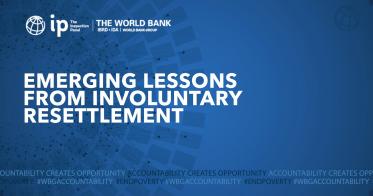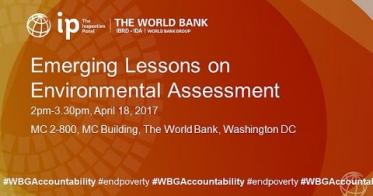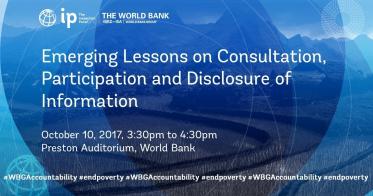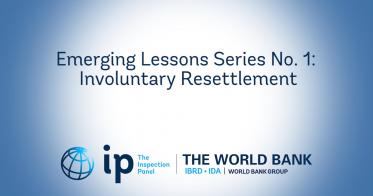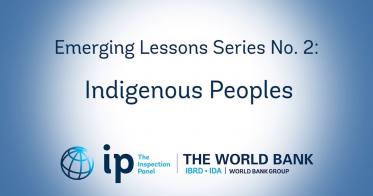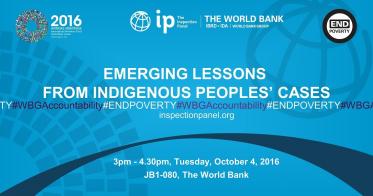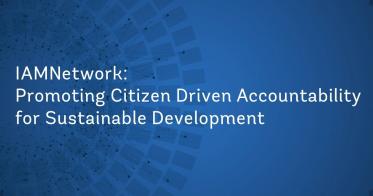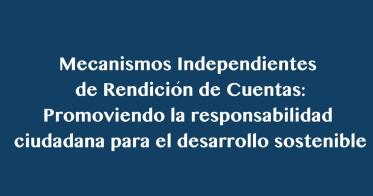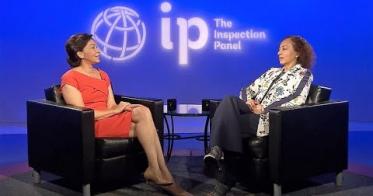Emerging Lessons Series Involuntary Resettlement 12 April 2016
World Bank’s Inspection Panel released a report on involuntary resettlement on 12 April 2016 during the Spring Meetings 2016 of the Bank and Fund. The report is the first in a series of papers to be published by the Panel drawing on the main emerging lessons from its 22-year caseload. The Panel hopes the report will highlight areas in which continued improvements can enhance World Bank's overall approach to resettlement and, in that regard, be useful to both the Bank and the global development community.
Emerging Lessons Series No. 3: Environmental Assessment - World Bank Inspection Panel
Accountability and transparency are critical to upholding the highest standards of international development. The Inspection Panel, the World Bank’s Independent Accountability Mechanism, has embarked on a series of reports intended to identify lessons that have emerged from its caseload since the mid-1990s with the goal of building institutional knowledge, enhancing accountability and contributing to more effective development. The objective of this event is to identify lessons that can be learned from Panel cases involving environmental assessment issues and what those lessons mean as the Bank implements its new Environmental and Social Framework.
Emerging Lessons Series No. 4: Consultation, Participation & Disclosure of Information
Accountability and transparency are critical to upholding the highest standards of international development. The Inspection Panel, the World Bank’s Independent Accountability Mechanism, has embarked on a series of reports intended to identify lessons that have emerged from its caseload since the mid-1990s with the goal of building institutional knowledge, enhancing accountability and contributing to more effective development. The objective of this event is to identify lessons that can be learned from Panel cases involving consultation, participation and disclosure of information issues and what those lessons mean as the Bank implements its new Environmental and Social Framework. This video is the recording of the hour-long session of the panel discussion.
Emerging Lessons Series No.1 : Involuntary Resettlement - World Bank Inspection Panel
Gonzalo Castro de la Mata, Chairman discusses about the report on involuntary resettlement, the first in a series of papers to be published by the Panel drawing on the main emerging lessons from its 22-year caseload. The Panel hopes the report will highlight areas in which continued improvements can enhance the World Bank’s overall approach to resettlement and, in that regard, be useful to both the Bank and the global development community.
Emerging Lessons Series No.2 : Indigenous Peoples - World Bank Inspection Panel
Inspection Panel Chairman Gonzalo Castro de la Mata discusses the Panel’s recently released report on indigenous peoples, the second in a series of papers drawing on the main emerging lessons from the Panel’s 22-year caseload. The Panel hopes the report will highlight areas in which continued improvements can enhance the World Bank’s overall approach to indigenous peoples issues and, in that regard, be useful to both the Bank and the global development community.
Launching Session - Emerging Lessons Series 2 : Indigenous Peoples' Cases
The Inspection Panel on October 4 released the second report in its Emerging Lessons Series. The report, which detailed lessons from Panel cases involving indigenous peoples, was released at a side event to the International Monetary Fund-World Bank Group Annual Meetings. Panel Chairman Gonzalo Castro de la Mata presented the main findings of the report at the event, which was chaired by Melanie Robinson, World Bank executive director. Maninder Gill, director with the World Bank’s Social, Urban, Rural and Resilience Global Practice, and Albert Barume, chairperson/president of the UN Expert Mechanism of the Rights of Indigenous Peoples also took part in the event. The report series identifies lessons emerging from the Panel’s 22-year caseload. The initial report in the series, which identified lessons from cases related to involuntary resettlement, was released in April. Subsequent reports will cover environmental and social assessment, and issues related to consultation, participation and disclosure of information.
IAMs Promoting Citizen Driven Accountability for Sustainable Development
SUBSCRIBE 55SUBSCRIBE SUBSCRIBED UNSUBSCRIBE
In the 1990s, international financial institutions began establishing Independent Accountability Mechanisms to provide recourse for people who believe they have been, or could be, harmed by IFI-supported projects. Today, a large number of multilateral and bilateral financial institutions have mechanisms. This video explains their work.
IAMs: Promoviendo la Responsabilidad ciudadana para el desarrollo sostenible
En la década de 1990, las instituciones financieras internacionales comenzaron a establecer Mecanismos Independientes de Rendición de Cuentas para proporcionar recursos a personas que creen que han sido o podrían ser perjudicadas por proyectos apoyados por IFI. Hoy en día, un gran número de instituciones financieras multilaterales y bilaterales tienen mecanismos. Este video explica su trabajo.
Reflections On 5 Years With The Inspection Panel - Zeinab El Bakri, Panel Member
Zeinab Bashir Elbakri completes her five-year term with the Inspection Panel, the World Bank's Independent Accountability Mechanism, on August 31. In a conversation with Inspection Panel Executive Secretary Dilek Barlas, Elbakri, a national of Sudan, discusses her reasons for joining the Panel in 2012, what has surprised her about the job, misconceptions about the Panel, the investigation that made the greatest impression on her, and what the Bank's new Environmental and Social Framework might mean for the work of the Panel.
Launching Session - Emerging Lessons Series 2 : Indigenous Peoples' Cases
The Inspection Panel on October 4 released the second report in its Emerging Lessons Series. The report, which detailed lessons from Panel cases involving indigenous peoples, was released at a side event to the International Monetary Fund-World Bank Group Annual Meetings. Panel Chairman Gonzalo Castro de la Mata presented the main findings of the report at the event, which was chaired by Melanie Robinson, World Bank executive director. Maninder Gill, director with the World Bank’s Social, Urban, Rural and Resilience Global Practice, and Albert Barume, chairperson/president of the UN Expert Mechanism of the Rights of Indigenous Peoples also took part in the event. The report series identifies lessons emerging from the Panel’s 22-year caseload. The initial report in the series, which identified lessons from cases related to involuntary resettlement, was released in April. Subsequent reports will cover environmental and social assessment, and issues related to consultation, participation and disclosure of information.

